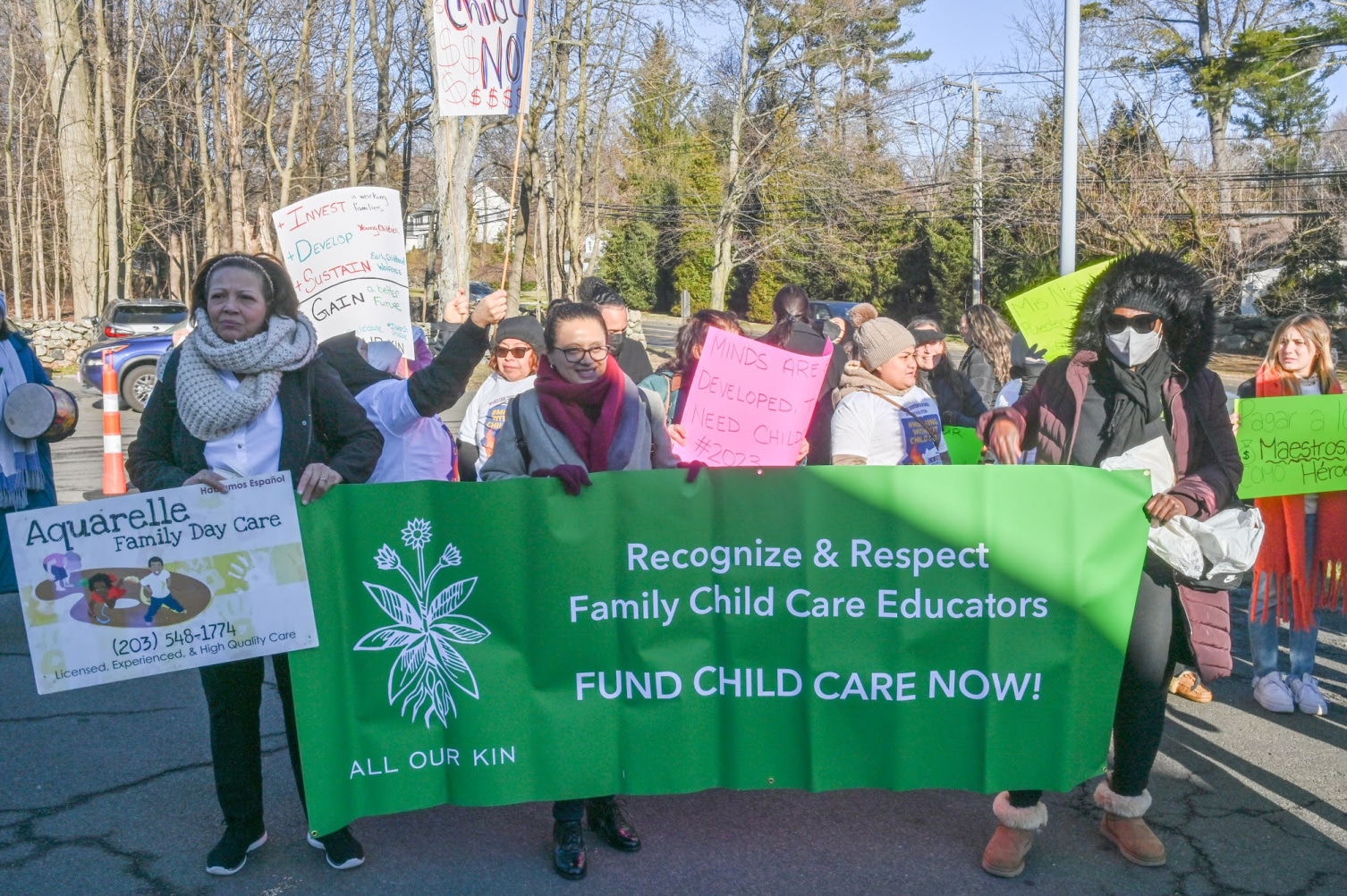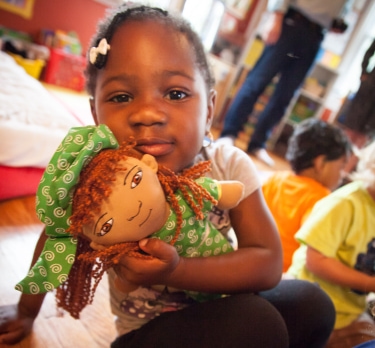


All Our Kin’s Policy and Field Building Team drives change in systems, policies, and practices so that family child care educators, children, and families – especially those from systematically marginalized communities – get what they need to thrive. We believe it is crucial for the voices of family child care educators to be represented at all policymaking tables. As such, we work with educators and partners to develop and advocate for policy solutions that center family child care educators and families, leverage coalitions to generate collective momentum, and collaborate with local, state, and national partners to share policy solutions and advocacy strategies that will increase systemic support for family child care.
Our New York and Connecticut policy staff work hand-in-hand with educators and our coaching and professional development teams in each of our direct service sites to directly influence state and local policy. Our advocacy in Connecticut and New York City is driven by our policy agendas:
At the Federal level, All Our Kin works in coalitions and in partnership with a number of federal policy and advocacy organizations to share our expertise and the experiences of family child care educators. We advocate for policies that include and advance family child care in these key areas: Child Care and Development Block Grant, Head Start, and the Child Care and Adult Food Program.
All Our Kin’s policy advising strand of technical assistance supports states and communities to create the conditions for family child care to thrive.
Through Policy Advising, All Our Kin partners with state and local leaders who are eager to support and strengthen family child care in their communities, offering concrete strategies and
guidance to move the needle on family child care policy and practice.
Interested in policy advising for state and local leaders, individual agencies, and cross-sector teams? Find more information here.

A Strong Economy Needs Strong Family Child Care: Principles and State Policy Recommendations (June 2020)
Our country’s reliance on family child care has never been more clear. In the face of the COVID-19 pandemic, licensed family child care providers are offering home-based care in small group settings and during nontraditional hours to support our health care professionals and emergency responders.
Despite their critical role supporting communities during this pandemic, family child care businesses have never been more at risk. Without significant investments and support, family child care programs may not survive the current business climate and parents may find themselves without child care when they return to work.
At a time when public health concerns make the small group size, flexible hours, and strong, trusting relationships that are the hallmark of family child care particularly attractive for children and parents, it is likely that the demand for family child care will increase.
Therefore, as states look to make decisions about economic recovery, their success depends on including family child care as a critical component of their plans to meet the changing needs of children, families, and employers.
In this document, you will find:
You can download the recommendations here.
Staffed Family Child Care Networks: A Path Towards a Stronger, More Sustainable Child Care System (July 2020)
During the COVID-19 pandemic, as policymakers are looking to 1) identify and scale critical supports for children and families and 2) build robust child care businesses that will outlast the current moment and sustain children, families, and the economy into the future, staffed family child care networks offer a promising solution. This brief combines the most up-to-date research with a set of guidelines based on two decades of on-the-ground experience to help policymakers understand what staffed family child care networks are and how they can be implemented for maximum impact.
You can download the brief here.
Creating the Conditions for Family Child Care to Thrive: Strategies for Increasing the Supply, Quality, and Sustainability of Family Child Care in States and Communities (October 2019)
We are at a pivotal moment for the future of family child care. Recent years have seen historic investments in early care and education at the local, state, and federal levels, and communities increasingly recognize that supporting family child care is a key strategy to address critical gaps in the child care access, quality, and affordability. At the same time, family child care businesses are closing rapidly across the country.
This publication presents a framework for how state and local leaders can create the conditions for family child care to thrive in their communities, thereby increasing the supply, quality, and sustainability of child care options that meet the needs of all families.
We offer concrete strategies at the intersection of policy and practice across six domains:
By working across these six domains, we believe that we can build a comprehensive early child care and education system that values family child care and works for all children and families--including those that face the greatest barriers to accessing care.
You can download the full publication here.
You can download the Executive Summary here.
All Our Kin's NYC Recommendations for Building A Sustainable Child Care System
The COVID-19 pandemic has put in stark relief New York City’s long-standing child care crisis. Workforce recruitment and retention challenges have plagued the industry for years, and recent staff shortages, lost wages, and closures have forced underpaid educators to turn to other professions. Today, as families face increasing difficulty finding child care, our economic recovery depends on the availability of accessible, high-quality child care options - as do the futures of our youngest children, whose providers continue to offer high-quality learning experiences with few resources.
This is particularly true for family child care providers who make up one of the most prevalent forms of care in New York City, comprising nearly three-quarters of providers and 37 percent of the city’s licensed child care capacity for children from birth to five.
But with every crisis comes opportunity. During Eric Adams’ mayoral campaign, he asserted, “It is a moral imperative that we provide universal childcare.” The
Mayor now has an unprecedented opportunity to invest in our City’s long-term economic stability by making the critical work of family child care providers intrinsic to his
Administration’s child care policy.
Mayor Adams should seize the moment to become a vanguard of change as he puts his child care plans in action. To build a child care system that works for all New Yorkers, there must be an
equal emphasis on increasing access to care, increasing compensation for family child care providers and supporting quality in
family child care (FCC), all while incorporating and elevating the voices of family child care educators. To that end, All Our Kin offers the following
recommendations that encompass these principles, and are based on the organization’s experience and best practices developed over the past two-plus decades.
Read our full recommendations here.
© 2020 All Our Kin. All rights reserved.
The information, materials and other content on this site are provided solely for informational and educational purposes.
All Our Kin does not provide legal or medical advice and assumes no responsibility for any consequences relating directly
or indirectly to any action or inaction you take based on the content. See here for our Terms of Use.
Website by Morweb.org